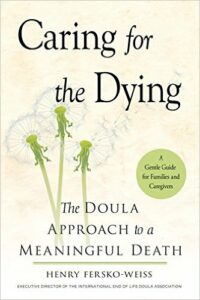The Questions We Struggle With: An Excerpt From Caring for the Dying, The Doula Approach to a Meaningful Death

So, when pressed for an answer to some of the common questions people ask, the doula will put the question back to the person. For example, when a dying person asks what happens after death, the doula might respond with: “What do you believe happens?” Giving the question back to the person asking it can open an important dialog. It helps the person to continue to reflect on their thinking and even go deeper into the dilemma or anxiety that often lurks just behind the question.
If the doula were to offer their idea or belief, it might stifle further exploration. Other ways to toss a question back include: “What do you think?” or “What has your experience taught you?” or “What does your faith tradition or culture tell you about this?” Putting questions back to a person compels them to stay with their internal struggle.
The doula approach honors struggle in recognition that satisfying answers generally come only from wrestling with a question. The internal search can’t be rushed. Like tasting wine, a person has to swish an answer around inside for a while to get a sense of its body, sniff its aroma for its subtler elements, and hold it on the tongue to distinguish its hidden flavors. Then they can come to appreciate its value.
If a person is stuck and can’t move forward, the doula might suggest that they try on different answers and see what emotions and thoughts come up with each set of shoes they step into. At times, visualization has proven very successful in allowing a person to try out different scenarios, again asking them to feel what fits, not what they think is the most pleasing answer.
Another approach is to temporarily sidestep the question and explore what gives the person strength—the inner resources that gave them the ability to handle difficult questions in the past, their sources of resilience, and looking at whether or not they are accessing that strength or resilience. If not, why?
But the doula will also recognize when the person can’t go any further—at least for the moment. At that point, it is helpful to sum up what has been discussed, review where the person is right now, and suggest some next steps to continue the process. Even though an exploration may feel incomplete, it may still be very meaningful for the person—it may open a door for them at some time in the future.
At the right moment, a doula’s experience or belief might open the door to another perspective for a dying person or family member—but only after utilizing all the other approaches, and in the hope that the person will explore the doula’s perspective and digest it internally.
Earlier I wrote about my father’s death and the guilt I felt after missing his last breaths. That experience has certainly contributed to my mythology about death—informing my thinking about the importance of being present for the last breaths. There are times when I share that experience as a way of offering an idea that might further a discussion between a dying person and the family about being present at the end.
Sometimes, however, people give up in the face of questions that seem too difficult or perplexing for them. Then the doula will find a way to be supportive and nonjudgmental. Ultimately, compassionate, loving support is even more important than finding the answers to troubling questions.
Family and caregivers also need to understand this. For them, it may be more difficult to accept that their loved one simply can’t go further in finding or accepting an answer to a question they have struggled with. In families, we tend to push one another into beliefs, especially if we think the person would be happier thinking something different. But this can make the dying person feel worse and resent the person doing the pushing. So family members have to find in their hearts the ability to support their loved one, no matter where they are in confronting the inevitable questions they have as they approach death.”
